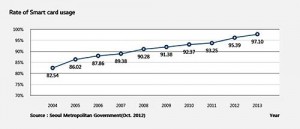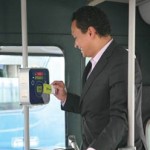LG CNS, one of the global IT services providers, has deployed public transportation solutions in cities such as Seoul in Korea, Wellington in New Zealand, Bogota in Colombia and Athens in Greece. The company has a subsidiary in India.
LG CNS Smart Transportation Solutions provide total service, from consulting and architecture design to system implementation and technology to optimize traffic flow and facilitate ecofriendly and safe mobility. It maximizes operational efficiency and safety utilizing its smart technologies.
On July 2003, LG CNS was awarded to implement a globally unique system that restructured Seoul’s public transportation network providing integrated fare collection and settlement from both buses and subways via a single smart card, and offering revenue apportionment to multiple public transit operators. Also LG CNS joined hands with the Seoul Metropolitan Government and established the KSCC (Korea Smart card Co, Ltd) in order to secure a more stable business environment for mass transit system.
Earlier, transportation system in Seoul was not able to cope up with the growth of population. Thus, the traffic conditions in Seoul worsened rapidly. Through the reforms of transportation system, LG CNS linked 765 Bus Routes (around 10,000 buses), 9 metros lines (391 stations), and around 83,000 taxis with a single T-money card, a smart card, in Seoul. Citizens were able to use public transportation enjoying considerable transit benefits.
 Not only for the public transportation, by implementing integrated solutions in micropayment industry– about 30,000 stores, 500 parking lots, 1,900 public services, 5,000 vending machines—the card also can be used in convenience stores to purchase goods. Through this smart card, citizens get reduction in their transportation costs due to its distance scale rate system. Also, it is able to forecast accurately the public transportation demand based on real data, which is essential to establish effective policies and enhance accessibility of passengers using all modes of public transportation simply by tagging a single all-access smart card.
Not only for the public transportation, by implementing integrated solutions in micropayment industry– about 30,000 stores, 500 parking lots, 1,900 public services, 5,000 vending machines—the card also can be used in convenience stores to purchase goods. Through this smart card, citizens get reduction in their transportation costs due to its distance scale rate system. Also, it is able to forecast accurately the public transportation demand based on real data, which is essential to establish effective policies and enhance accessibility of passengers using all modes of public transportation simply by tagging a single all-access smart card.
Today, 100 million prepaid T-money cards are already issued and 71 million cards are in use. Thanks to the Automated Fare Collection( AFC) Solution, Seoul boasts as one of the most convenient and safest public transportation networks in the world.
LG CNS was awarded the contract to deliver and operate a new AFC system for the SIRCI project which covers over 6.5 million trips per day in Colombia. The modes of transport consist of a BRT system consisting of 1,666 trunk buses running on 75 lines with 157 stations and 1,006 gates, about 9,900 zonal buses run by 9 operator and 914 feeder buses which feed the BRT stations.
Bogota, Colombia was one of the cities that were suffering from heavy traffic congestion. Public transportation worsened the congestion by passing designated bus stops or stopping randomly. In order to improve ineffective bus intervals and inconvenience and complicated bus routes, TransMilenio S.A., the Bogota transportation organization, selected LG CNS as the operator through the public open bidding. The project has the solution implemented for i more than 10,000 buses and over 26 stations on its third BRT service.Also LG CNS integrated the first and second Bus Rapid Transits to the new system to provide a single convenient smart card to citizens.
When a passenger tags his smart card on the reader installed in the bus, information on the ride fare and fleet location of buses are directly sent to TransMilenio control centre in real-time. These are other solutions called FMS (Fleet Management System) and TMS (Traffic Management System). These will reduce the heavy congestion and give more reliable public transportation information services to citizens.The third BRT line, about 700 Trunk buses, 250 Feeder buses and 10,000 Zonal buses have been reformed via SITP program (Colombian FMS).
 FMS optimizes the fleet schedules and monitors all activities of the vehicle in real-time. By integrating devices and back office solution, it’s able to monitor the status and locations of the fleet on the geographic and synoptic map. This information is offered to the drivers with the rate of punctuality for the planned schedule and helps the passengers decrease waiting time by compliance of regularity and frequency. The Traffic Management System provides an integrated and systematic solution across the entire span of traffic management, including traffic information analysis, real-time traffic flow monitoring and incident management, advanced traffic signal control and traffic violation enforcement. As the result, the city can monitor the operating status of all buses of the city comprehensively and enhance efficiency of controlling the buses from in one centre. And it helps the bus companies do cost-effective bus operation and management such as making the bus operation plan, dispatching drivers and buses, and controlling operation.
FMS optimizes the fleet schedules and monitors all activities of the vehicle in real-time. By integrating devices and back office solution, it’s able to monitor the status and locations of the fleet on the geographic and synoptic map. This information is offered to the drivers with the rate of punctuality for the planned schedule and helps the passengers decrease waiting time by compliance of regularity and frequency. The Traffic Management System provides an integrated and systematic solution across the entire span of traffic management, including traffic information analysis, real-time traffic flow monitoring and incident management, advanced traffic signal control and traffic violation enforcement. As the result, the city can monitor the operating status of all buses of the city comprehensively and enhance efficiency of controlling the buses from in one centre. And it helps the bus companies do cost-effective bus operation and management such as making the bus operation plan, dispatching drivers and buses, and controlling operation.
 TrafficInfraTech Magazine Linking People Places & Progress
TrafficInfraTech Magazine Linking People Places & Progress